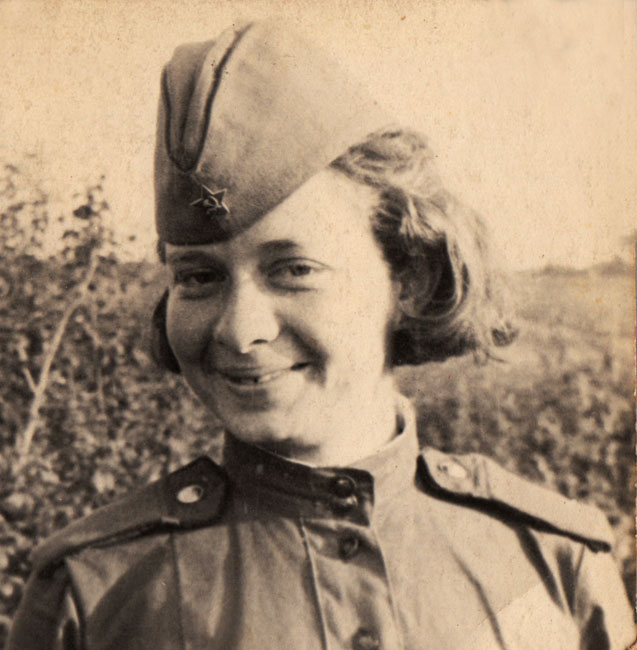Frida Lekhtman was born in 1921 in the village of Litino, Ukraine. When Frida was two years old her family moved to Vinnitsa, where she graduated from a 7-year Yiddish school. Afterwards she graduated from the city's construction institute.
When war broke out between the Soviet Union and Nazi Germany on June 22, 1941, being aware of the great danger posed to the Jews by the Nazis, Frida Lekhtman and her parents made their way to the Aktiubinsk District, Kazakhstan. Her brother was drafted into the Red Army. In May 1942 she volunteered to join the Red Army and, after completing Moscow Radio School in November 1942, she was assigned to be a company radio-operator in a communications battalion on the Western Front. Using the Morse code, Lekhtman transmitted the orders of the battalion's command and provided communication that facilitated joint operations of the battalion's divisions. Frida carried out her assignments at night, spending over 14 hours straight on duty without leaving her telegraph apparatus. On March 10, 1944 Frida Lekhtman was awarded the Medal for Combat Merit. From June 1944 she participated in Operation Bagration (June 23 - August 29, 1944) for the liberation of Belorussia, the Baltic States, and eastern Poland. Serving as a secretary of the 113 Infantry Corps political administration, both before and during the Red Army offensives in East Prussia, she provided the Political Administration of the Red Army, as well as the political administrations of other units, with accurate real-time information. She was also in charge of registering and preserving various military documents. For her achievements, on January 23, 1945, Sergeant Frida Lekhtman was decorated with the Order of the Red Star and, shortly afterwards, also the Order of the Patriotic War, 2nd class. Frida Lekhtman ended the war in Königsberg, East Prussia in May, 1945. In July 1945, along with her military unit, she was relocated to Port Arthur in the Soviet Far East. In November of the same year she was discharged. She returned to Vinnitsa, where shortly afterwards she was united with her family, who returned from the evacuation. Subsequently she worked in Vinnitsa as a building-technician and, later, as an engineer.
Interview with Frida Lekhtman
In the interview given by Frida Lekhtman, in Vinnitsa, Ukraine to The Blavatnik Archive Foundation in 2009 she stressed that during her military service in the Red Army she personally did not experience any antisemitism. At the same time Frida mentioned how she learned about the mass murder of Jews during World War II:
"There were even some cases when just for the word "kike" [soldiers] were summoned before the political commission [of the Corps] and even officers were sent to the front.… Once I was driving and the head of the [113 Infantry Corps] political department was driving with me. He told me [about the mass murder of the Jews]. That was in 1944. I didn't know [about it] until then. Afterwards I met some partisans. Once, when I was returning to my unit from the military hospital [near Orsha, Belorussia, where she had been admitted after being wounded], I heard [people speaking] Yiddish. I became interested since I had not heard Yiddish for quite a long time.… I approached them, heard them [speaking about the murder of the Jews], and I spoke with them."
From: The Blavatnik Archive Foundation UKR062







